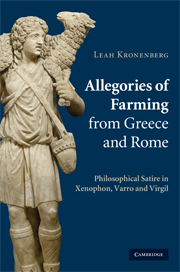PART I - XENOPHON'S OECONOMICUS
Published online by Cambridge University Press: 03 May 2010
Summary
The Oeconomicus begins with a discussion between Socrates and his young friend Critobulus on the meaning of estate management (oikonomia) and the value of farming (chs. 1–6). Most of the work, however, is dominated by a third figure, the Athenian gentleman-farmer Ischomachus, whose reputation for being kalos kagathos (roughly, “noble and good”) led Socrates to desire to learn from him how he runs his household and estate. The second part of the dialogue (chs. 7–21) consists of Socrates' recounting of this discussion with Ischomachus to Critobulus. Interpretations of the work turn on how the reader interprets the character of Ischomachus and unites the past discussion between Ischomachus and Socrates with the present one between Socrates and Critobulus. Ischomachus, as a typical Athenian gentleman with a reputation for kalokagathia, represents the conventional virtues of the polis, and for many his teachings represent the ideological core of the dialogue. Yet, he may also be identified with a historical Ischomachus, who eventually lost much of his wealth and whose wife was involved in a notorious scandal after his death, which involved bearing a son to her daughter's husband. Whether or nor this identification is correct, I will argue that within the course of the dialogue, Socrates undermines the values that structure Ischomachus' moral and political views and shows them to be based entirely on material notions of success.
- Type
- Chapter
- Information
- Allegories of Farming from Greece and RomePhilosophical Satire in Xenophon, Varro, and Virgil, pp. 37 - 38Publisher: Cambridge University PressPrint publication year: 2009

